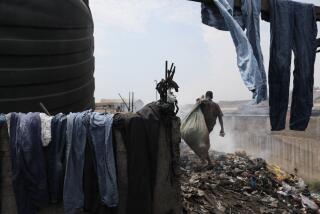Task Force to Urge Curbs on Apparel Firms
- Share via
A presidential task force Monday will unveil proposals designed to eliminate sweatshops, including a prohibition against requiring U.S. apparel employees to work more than 52 hours a week.
Some trade groups representing apparel manufacturers and retailers are already criticizing the overtime limits and other proposals.
And one company on the 23-member White House panel broke ranks, saying it could not support a recommendation for additional workplace monitoring.
The recommendations are part of a proposed code of conduct for apparel makers and their contractors in the U.S. and abroad.
The task force--which includes representatives of major apparel manufacturers, labor unions and human rights groups--is expected to present its recommendations on wages and working conditions at a White House ceremony. President Clinton is expected to urge apparel makers and retail chains to voluntarily adopt the standards.
The response of apparel manufacturers is of special significance in the Los Angeles area, where the garment industry is the second-largest employer. However, the Southland, the nation’s largest producer of apparel, has begun to lose jobs as Guess Inc. and others move production to low-cost facilities abroad.
Task force standards would apply to the foreign and domestic contractors of companies that accept the voluntary code. Apparel manufacturers on the task force--including Liz Claiborne, L.L. Bean, Nike and the Ventura-based Patagonia--are expected to adopt the recommendations.
*
If the recommendations are widely accepted by U.S. manufacturers, foreign apparel companies will be more likely to raise their wages and work standards, some task force members contend.
Under the proposed workweek standards, companies cannot require American employees to work more than 12 hours of overtime per 40-hour week unless there are unusual circumstances such as production emergencies.
The maximum workweek would be 60 hours for foreign operations, including a 12-hour limit on overtime. The task force is calling for a basic workweek of 48 hours in countries that do not already have a standard of fewer hours.
A spokeswoman for the American Apparel Manufacturers Assn. criticized the 52-hour limit in the U.S. as impractical. “Manufacturers can’t predict their overtime needs,” Allison Wolf said. “This would strip manufacturers of needed flexibility and make it more difficult for them to operate in a highly competitive industry.”
Wolf said the standard could create labor disputes because disgruntled workers could take overtime grievances to a new association that would oversee labor code compliance.
The compliance association would be established later this year. It would require the labor code’s signatory companies to monitor their own factories and contractors. In addition, independent monitors would spot-check the factories and report to the compliance association.
One task force member, Warnaco Group Inc. of New York, opposed the extra tier of monitoring. Warnaco, which manufactures Calvin Klein and other brands, said that for proprietary reasons, it did not want to divulge information to a compliance association or its agents.
“Warnaco already employs an outside auditor who monitors the company’s operations,” a company spokesman said.
Companies that hire their own independent monitors do not need additional scrutiny, agreed Lonnie Kane, president of the California Fashion Assn., which represents major apparel manufacturers in Southern California.
Kane said many firms have eliminated sweatshop abuse in factories and at the sewing shops of their contractors by hiring accounting firms and professional inspection services. An additional inspection would delay the production process and make it more difficult to make timely shipments to retailers, Kane said. The association has not yet taken a position on the code of conduct, Kane added.
Less controversial issues were previously resolved by the panel. For example, the group agreed that children under 14 should not be employed in apparel plants abroad.
The panel also agreed that apparel companies should pay at least the minimum wage, or more if the minimum standard of the host country falls short of workers’ basic needs.
Among the issues that may take months to resolve is how to inform the public which companies are complying with the standards. Some task force members favor a “no sweat” clothing tag. The National Retail Federation opposes labeling, contending that tags can be counterfeited.
*
Although several trade groups believe that the recommendations are too far-reaching, others believe they fall short.
“There aren’t a lot of teeth in this code,” said Bud Konheim, chief executive of Nicole Miller, a New York-based apparel firm.
The position of human rights and labor groups on the panel is also mixed. The Union of Needletrades, Industrial and Textile Employees said the code “addresses the worst abuses in the industry” but that the anti-sweatshop campaign has a “long way to go.”
The task force was formed by former Labor Secretary Robert Reich on Aug. 2, exactly one year after investigators liberated more than 60 Thai workers held in virtual slavery at a garment sweatshop in El Monte.
Television personality Kathie Lee Gifford is among those on the panel. She helped form the task force after labor activists discovered that children were producing her Kmart line of clothing in Honduras.
More to Read
Inside the business of entertainment
The Wide Shot brings you news, analysis and insights on everything from streaming wars to production — and what it all means for the future.
You may occasionally receive promotional content from the Los Angeles Times.










